221 years ago today, Sir Joseph Paxton was born. A legend in the annals of British society, he achieved his fame with two completely unrelated accomplishments: the design, planning, and production of London’s Crystal Palace, and the cultivation of the Cavendish banana, the most widely eaten fruit varietal on Earth. READ about his life and accomplishments… (1803)
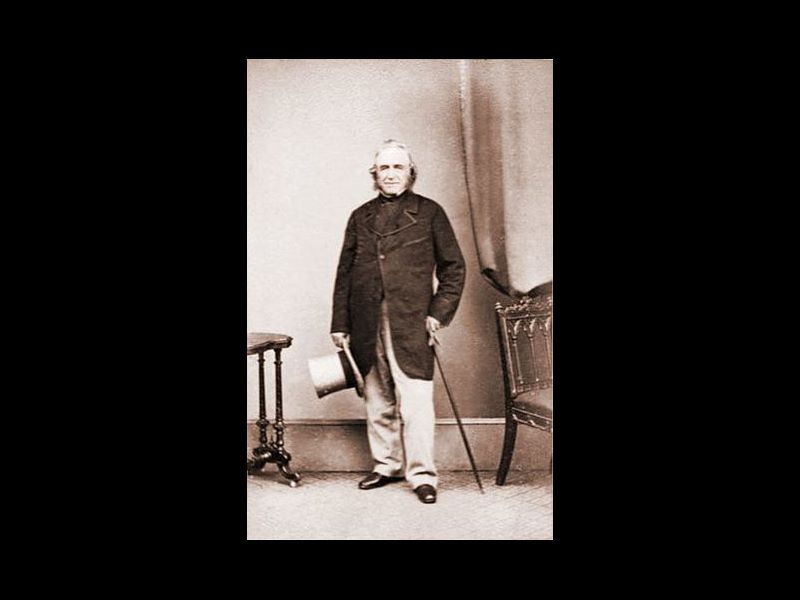 Joseph Paxton in 1860 – public domain
Joseph Paxton in 1860 – public domainHis family moved frequently, but eventually a young Joe Paxton got a position in 1823 at the Royal Horticultural Society’s Chiswick Gardens. Not long after that, the Duke of Cavendish, whose residence was near at hand to the gardens, spied the devoted and accomplished gardener and offered him a position at Chatsworth—the Duke’s stately home in the Derbyshire Dales.
Nine years into his work, Paxton took on the project of the construction of large greenhouses at Chatsworth, called conservatories. At the time the use of glass houses was in its infancy and those at Chatsworth were dilapidated. After experimentation, he designed a glass house with a ridge and furrow roof that would be at right angles to the morning and evening sun and an ingenious frame design that would admit maximum light: the forerunner of the modern greenhouse.
In 1836, Paxton began construction of the Great Conservatory, or Stove, a huge glasshouse 227 ft (69 m) long and 123 ft (37 m) wide. While the largest sheets of glass made in England at the time were 3 feet long, Paxton managed to secure 4-foot sheets for the Stove. He followed this building up with the Conservative Wall, which unlike the Stove, still stands today.
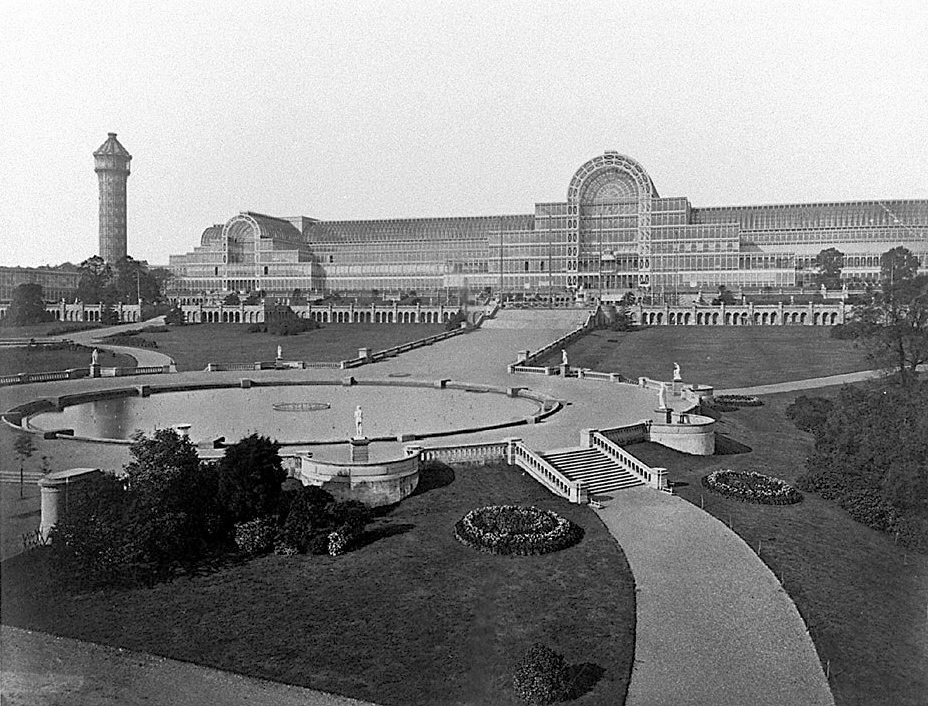 Crystal Palace view from the Water Temple
Crystal Palace view from the Water TempleAlong with allowing him to become an expert at cultivating tropical plants in Britain, he became the nation’s foremost expert in glass houses, and so, in 1851, Paxton undertook to build a magnificent “crystal palace” for the Great Exhibition of Hyde Park.
Its novelty was its revolutionary modular, prefabricated design, and use of glass. Glazing was carried out from special trolleys, and was fast: one man managed to fix 108 panes in a single day. The Palace was 1,848 ft (563 m) long, 408 ft (124 m) wide and 108 ft (33 m) high. It required 4,500 tons of iron, 60,000 sq ft of timber, and over 293,000 panes of glass. Yet it took 2,000 men just eight months to build, and cost just £79,800. Quite unlike any other building, it was itself a demonstration of British technology in iron and glass. All three architects, Paxton included, were knighted, and the palace stood until it was destroyed in a fire in 1936.
MORE Good News on this Day:
Happy 61st birthday to James Hetfield, the lead singer and rhythm guitarist of Metallica. The thrash metal kings have featured only 2 permanent members, Hetfield, and the drummer Lars Ulrich, who together co-wrote nearly all the band’s material over the period that saw them rise from heavy metal standouts to global superstars of the highest order. Hetfield himself has shared guitar duties with Kirk Hammet for most of the band’s existence, the latter stages of which have seen Hetfield come out from behind Hammet’s shadow in terms of complex guitar leads and blistering solos.
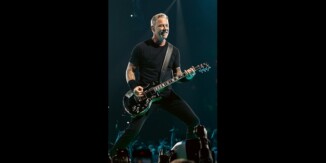 James Hetfield live in 2023 – CC BY SA 4.0. Kreepin Deth
James Hetfield live in 2023 – CC BY SA 4.0. Kreepin DethIn 1997 Hetfield got married and moved to his wife’s hometown of Vail, Colorado. There, one of heavy metal’s most iconic voices spends devoted hours keeping bees. He also is an accomplished hunter, and farms when he isn’t touring. (1963)
32 years ago today, Clint Eastwood took “one last job” in Unforgiven, which debuted in theaters in Los Angeles. Co-starring Morgan Freeman and Gene Hackman, the film was an enormous success—on the financial side grossing more than 10x production costs, and on the critical side, winning four Academy Awards including Best Picture, and being selected for the National Film Registry for being “culturally, historically, or aesthetically significant.”
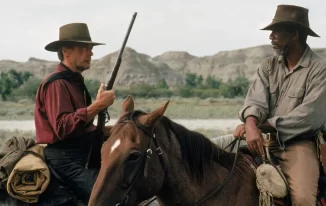 Still image from Unforgiven – Fair Use.
Still image from Unforgiven – Fair Use.Sometimes called “Revisionist Western” the film works to mainly deconstruct the black-and-white morality established in earlier Western movie cultures. In some ways, it borrows from Russian literature, in that it displays often the reality of a lack of morals in the actions of people in immoral situations, and ends up presenting instead a kind of mural of human wretchedness.
The protagonists, rather than avenging the murder of a God-fearing innocent, are hired to collect an illegally placed bounty by a group of prostitutes on lawful yet debauched men. The protagonists who claim to be fearless killers are either exposed as cowards and weaklings or self-promoting liars. The “law” in this case is also a ruthless killer, who himself, a little like the film’s writers, repeatedly attempts to discredit the image of Western gunslinger heroes through his interactions with a biographer.
To wit, Rotten Tomatoes writes of the film “As both director and star, Clint Eastwood strips away decades of Hollywood varnish applied to the Wild West, and emerges with a series of harshly eloquent statements about the nature of violence.” (1992)
On this day 98 years ago, Tony Bennett, the famed jazz and pop singer, who passed away just last year, was born.
Bennett revealed in February that he was diagnosed with Alzheimer’s in 2016, but it’s been progressing slowly. “Touring keeps him on his toes and also stimulates his brain in a significant way,” said his doctor. Along with 6 dates in 2021, Bennett will perform tonight and Thursday with Lady Gaga at NYC’s Radio City Music Hall, celebrating a friendship that began a decade ago with a song on Bennett’s Duets album, that led to their LP Cheek to Cheek and its concert tour.
 Dwight McCann, CC license
Dwight McCann, CC licenseWinner of 19 Grammys, he grew up in a poor family of Italian immigrants, but his uncle was a vaudeville tap dancer, giving Tony an early window into show business.
After singing in restaurants for money at age 13, he had three No.1 pop hits in the 50s—Because of You, Cold, Cold Heart, and Rags to Riches—but moved on to jazz and became the first male pop vocalist to sing with Count Basie. His 1962 cover, I Left My Heart in San Francisco, won two Grammys and became Bennett’s signature song—along with If I Ruled the World.
A World War II veteran, Bennett has sold over 50 million records worldwide, including his MTV Unplugged platinum LP that won the top prize, Album of the Year.
In concert, Bennett always sings one song (usually Fly Me to the Moon) without any microphone or amplification, demonstrating his expert vocal projection, as seen in this video…
Also an accomplished painter, he founded the Frank Sinatra School of the Arts High School in Astoria, Queens. You can also read his autobiography, The Good Life and WATCH a spine-tingling song recorded in his home last year during lockdown… (1926)
88 years ago today, Jesse Owens shocked Adolf Hitler and the Nazis hosting the Berlin Olympics by winning the 100-meter dash.
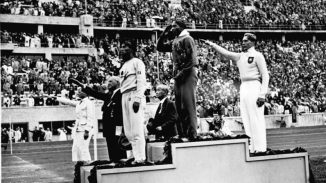 Click to enlarge
Click to enlargeOwens, a black American, also became the first United States athlete to win four gold medals in track and field at the Olympic games. (1936)
Also 148 years ago today, Alexander Graham Bell conducted the world’s first definitive telephone tests.
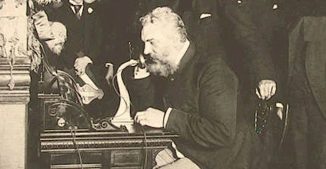
He made the first intelligible telephone call from building to building, near Brantford, Ontario. In a one-way transmission, he heard his uncle David Bell recite Hamlet, saying, “To be or not to be…” Bell confirmed Brantford as the birthplace of the device in a 1917 speech at the unveiling of the Bell Memorial there: “Brantford is right in claiming the invention of the telephone here…where “the first transmission to a distance was made between Brantford and Paris”—13 miles away. (1876)
Also, 124 years ago today, Ernie Pyle, the famous World War II American war correspondent, was born in Dana, Indiana. The Pulitzer Prize-winning journalist was best known for his stories about ordinary Americans—especially soldiers serving overseas.
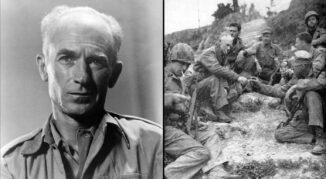 Pyle shares a cigarette with troops in the Pacific
Pyle shares a cigarette with troops in the PacificSyndicated in hundreds of Scripps-Howard newspapers, his simple accounts were distinctive for their folksy style.
After volunteering to write wartime reports from Europe beginning with the Battle of Britain, he went to the Pacific to cover the war with Japan, where in 1945 he was killed by enemy fire during the Battle of Okinawa. Pyle won the Pulitzer Prize the previous year for his newspaper accounts of “dogface” infantry soldiers told from a first-person perspective. His well-known column was published in 400 daily and 300 weekly newspapers nationwide, and Pyle’s wartime writings are preserved in four books. His most famous column, The Death of Captain Waskow, written in 1943, was later selected by The National Society of Newspaper Columnists as “the best American newspaper column of all time”. WATCH a tribute… (1900)
SHARE the Milestones, Memories, and Music…
Source link

